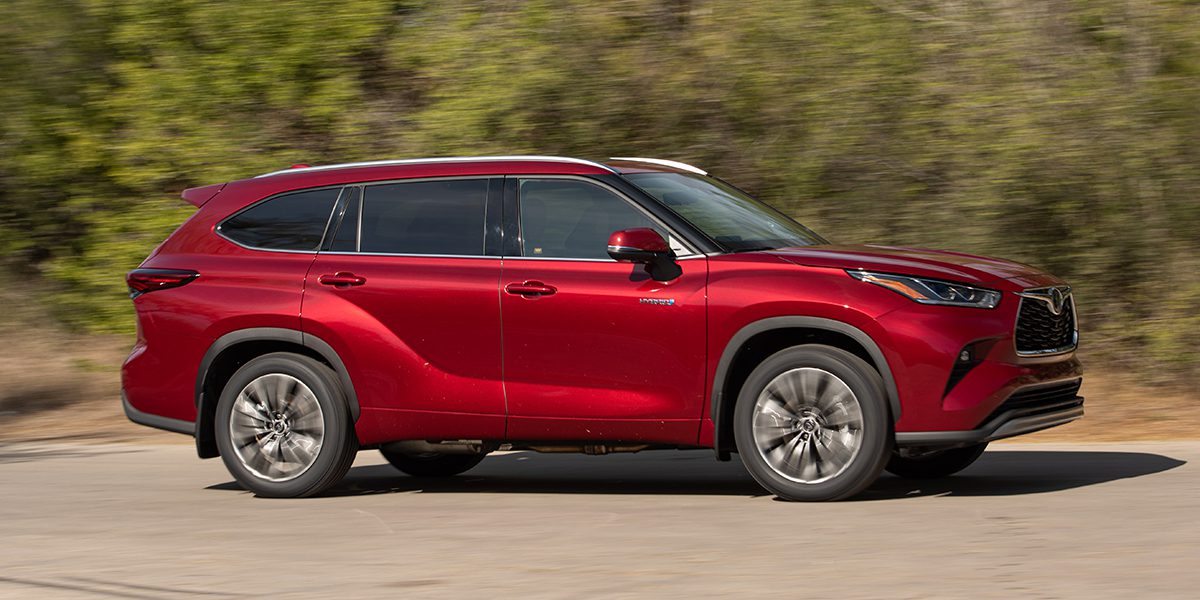Pros: Hybrid’s fuel economy; comprehensive list of standard safety features; good driving dynamics; classy cabin trim in topline models
Cons: Third-row seats are best suited for children
CG Says: Toyota’s 3-row midsize crossover SUV is redesigned for 2020, gaining more cargo room; several newly available features; and a new, more-efficient hybrid powertrain. The new Highlander is 2.4 inches longer than the previous-generation model, with the extra length benefitting the cargo area behind the third-row seat. While the previous Highlander Hybrid paired a 3.5-liter V6 with electric motors for a combined 306 horsepower and was only offered with all-wheel drive, the new hybrid has a 2.5-liter 4-cylinder/electric powertrain that makes a total of 243 hp and can be had with front-wheel drive or all-wheel drive. Although down on power, the new hybrid still delivers respectable acceleration and offers significantly better fuel economy; its EPA rating in combined city/highway driving is 35 mpg with AWD and 36 with FWD. In terms of non-hybrid Highlanders, the 295-hp 3.5-liter V6 engine from the previous generation is carried over, and the 4-cylinder engine has been dropped. Both gas and hybrid engines are paired with an 8-speed automatic transmission. Newly standard features include Apple CarPlay and Android Auto functionality, Wi-Fi connectivity, satellite radio, and Amazon Alexa compatibility. Standard safety features include forward collision warning with automatic emergency braking and pedestrian detection, lane-keep assist, cyclist detection, adaptive cruise control, and road-sign assist. Available safety features include blind-spot alert, rear cross traffic alert, and obstacle detection. With the competition in the three-row midsize SUV market hotter than ever—especially with the addition of the Hyundai Palisade and Kia Telluride—the new Highlander had to be good, and it is. In terms of space, road manners, power, and available safety and technology features, it stands up well to its class rivals—but the excellent hybrid models might be the most compelling Highlanders of the bunch. They’re significantly more economical and affordable than the Ford Explorer Hybrid—the only other hybrid currently offered in the mainstream midsize SUV category.
| Class | Midsize SUV |
| Body Style(s) | 4-door wagon |
| Passenger Count | 7 or 8 |
| Drive Wheels | front-wheel drive, all-wheel drive |
| Manufacturer | Toyota |
| Nation of Manufacture | USA |
| Base Prices | L: $35,720 AWD L: $37,320 LE: $37,920 AWD LE: $39,520 XLE: $40,720 AWD XLE: $42,320 Limited: $44,770 AWD Limited: $46,720 Platinum: $47,970 AWD Platinum: $49,920 Hybrid LE: $39,320 AWD Hybrid LE: $40,920 Hybrid XLE: $42,120 AWD Hybrid XLE: $43,720 Hybrid Limited: $46,170 AWD Hybrid Limited: $48,120 Hybrid Platinum: $49,370 AWD Hybrid Platinum: $51,320 |
| Base Engine 3.5-liter V6 |
| Horsepower 295 |
| Std. Transmission 8-speed automatic |
| Avail. Transmission NA |
| EPA City Range (mpg) 20-21 |
| EPA Hwy Range (mpg) 27-29 |
| Optional Engine 2.5-liter 4-cylinder/electric (Hybrid) |
| Horsepower 243 |
| Std. Transmission 8-speed automatic |
| Avail. Transmission NA |
| EPA City Range (mpg) 35-36 |
| EPA Hwy Range (mpg) 34-35 |


